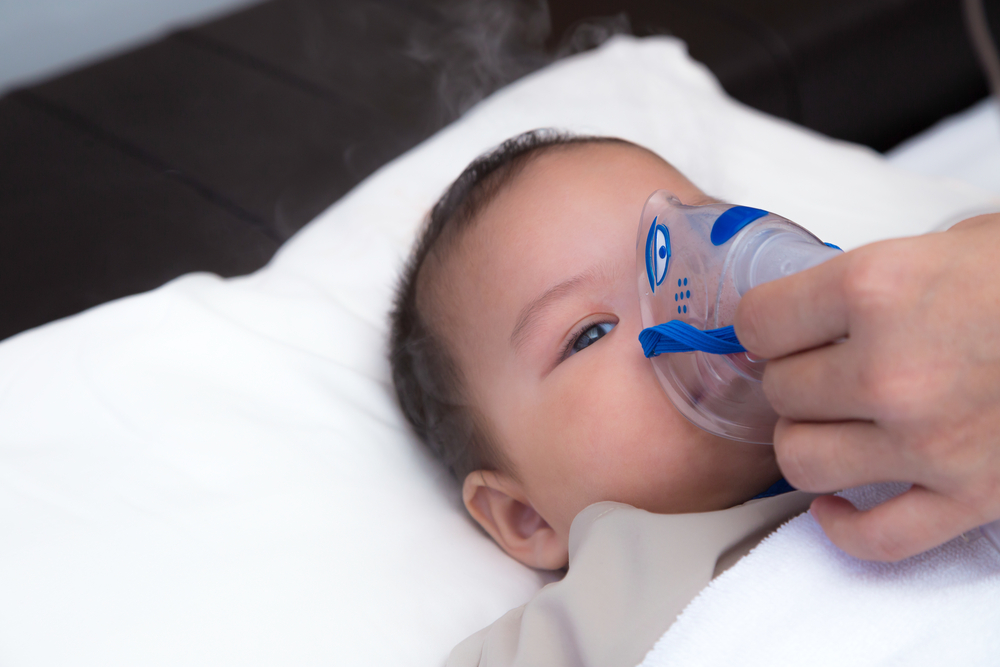Respiratory Syncytial Virus Infection (RSV) Treatment and Symptoms
Children's Health
•
Oct 1, 2021
Reviewed by:

Respiratory Syncytial Virus Infection, more commonly known as RSV, is a highly contagious, common respiratory illness that can lead to mild cold-like symptoms. According to the CDC, almost all children will have had an RSV infection by the time they are two years old. Despite its commonality, the virus can be serious in infants, young children, and older adults, possibly leading to pneumonia and bronchitis.
Wondering how to identify RSV symptoms? Want to know when to go to the emergency room for RSV? Complete Care explains how to tell the difference between RSV and the flu and shares advice on when to seek medical treatment.
RSV Symptoms
Kids or adults with RSV may have mild cold-like symptoms including:
- Sore throat
- Stuffy or runny nose
- Fever (read more on fevers in children)
- Coughing
- Sneezing
- Fatigue
- Headache
Is the RSV virus contagious? Respiratory Syncytial Virus Infection is highly contagious to infants, children, and adults for 3 to 8 days –– although individuals with weakened immune systems can continue to be contagious for up to 4 weeks. The virus spreads through droplets from the nose and throat and can live on surfaces, hands, and clothing.
So, if you’re taking care of a child or family member with RSV, do your best to avoid contact with the sick individual, wash your hands often, and do your best to maintain a healthy immune system.
RSV Treatment
There is no specific treatment for RSV infection, though researchers are working to develop vaccines and antivirals (medicines that fight viruses). Most cases of RSV are mild and do not require any formal treatment. That said, the virus will typically go away on its own within a week or two although smaller infants may need to be treated in the hospital.
Here are some tips to help with the symptoms of RSV at home:
- For infants, try a non-aspirin fever-reducer (DO NOT give aspirin to children with a viral infection)
- Get plenty of rest
- Drink plenty of fluids (juices mixed with water or sports drinks are a great option)
- Clear your nose before offering fluids
- Avoid using over-the-counter cold medicines in young children
If you have any questions regarding RSV treatment, never hesitate to call your doctor or pediatrician.
RSV vs. Flu Symptoms
Identifying RSV from the common cold or the flu can be a challenge as many of their symptoms overlap as they are all respiratory illnesses. The biggest difference between the two is how their symptoms begin. The influenza virus generally starts with aches and pains, progressing from them. Whereas RSV starts with symptoms of the common cold and leads to respiratory symptoms like coughing and wheezing.
To know for sure which virus you have, you can take the flu, RSV combined test at an urgent care facility near you. Keep in mind that it is possible to be infected with more than one virus at one time.
Can RSV cause swollen lymph nodes? Not typically. If you’re noticing swollen lymph nodes, ask your doctor about strep throat or mononucleosis.
Continue reading: How to Keep Yourself Healthy During Flu Season
When to go to the emergency room for RSV
As mentioned, older children and adults without comorbidities likely won’t experience anything more than common cold symptoms and be back on their feet within a week. But for older adults and children younger than 6 months of age, contracting RSV can be a serious issue as the virus can cause swollen airways, leading to respiratory distress. Regardless of your current health or age status, it’s always smart to be aware of emergency symptoms to watch for.
If you notice any of the below symptoms, call 911 or head to an urgent care facility immediately. An emergency room can provide IV fluids for dehydration and determine whether you need any breathing treatments.
- Develops a high fever
- Has a cough or other progressing symptoms
- Wheezing
- Shows symptoms of severe dehydration such as cracked lips,
- Drowsiness
- Has difficulty breathing
- Blue lips or fingernails
Worried you may have RSV symptoms? Head to a Complete Care emergency room for quality care.
Respiratory Syncytial Virus Infection (RSV) rates are especially high in the winter months and are often spread through school and daycare. Because it is a highly contagious virus that can be spread through surfaces, one of the best ways to prevent it is by washing your hands. If you have school-aged kids who present any of the symptoms, keep them away from younger infants.
Should you need to seek medical attention for RSV treatment, Complete Care’s 24/7 emergency centers are here for you. Thanks to our highly trained medical staff and on-site testing, we will have you and your family quickly back on your feet without the wait times of a traditional hospital.
Whether you have an emergency or just a simple health question, we will take complete care of you. Head into one of our ER locations for any of your emergency needs.
More Helpful Articles by Complete Care:
